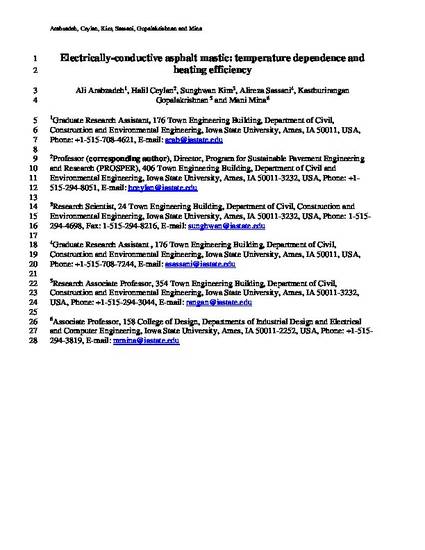
Asphalt mastic, a pitch-matrix composite, consists of bitumen and mineral fillers (very fine aggregates), that fills the voids created by coarser aggregates in asphalt concrete. In this study, asphalt mastic was modified with carbon fiber (CF) and graphite powder (GP) to produce single-phase (containing only CF) and two-phase (containing both CF and GP) electrically-conductive asphalt mastic (ECAM) for anti-icing and deicing applications. Volume resistivities of ECAMs were measured at two different temperatures and the influence of temperature on electrical conductivity was evaluated, revealing that reduction in temperature enhances the ECAM's electrical conductivity. After analyzing the volume resistivity data for both single-phase and two-phase ECAM specimens, heat generation efficiency of single-phase ECAM was investigated at a conductive material dosage slightly higher than the optimum. The heat generation efficiency was evaluated at a below-freezing temperature by performing active infrared thermography (IRT). Based on the active IRT analysis results, it was found that single-phase ECAM at the selected CF content is capable of generating enough heat for melting ice and snow or preventing accumulation of snow and formation of ice.
Available at: http://works.bepress.com/mani_mina/28/

This is a manuscript of an article published as Arabzadeh, Ali, Halil Ceylan, Sunghwan Kim, Alireza Sassani, Kasthurirangan Gopalakrishnan, and Mani Mina. "Electrically-conductive asphalt mastic: Temperature dependence and heating efficiency." Materials & Design 157 (2018): 303-313. doi: 10.1016/j.matdes.2018.07.059. Posted with permission.